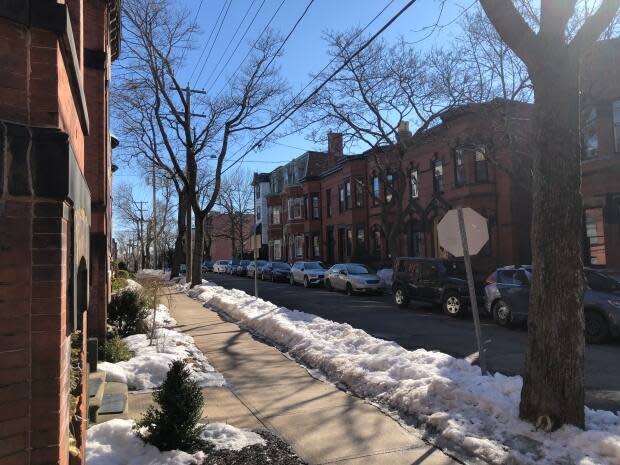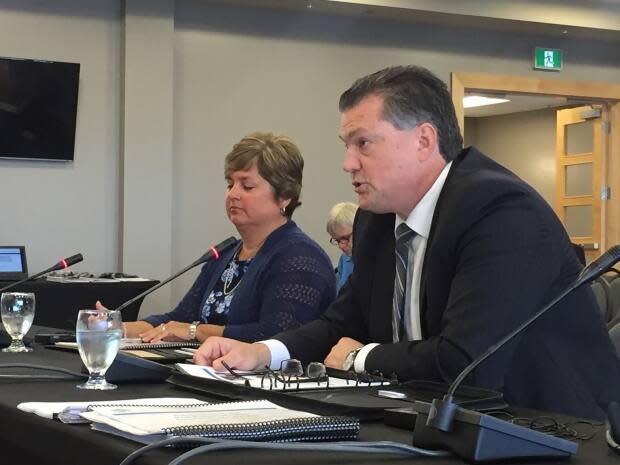Saint John tax cut financed by homeowners will mostly benefit business, government

A Saint John property tax cut meant to refund a one million dollar tax windfall the city is receiving entirely from homeowners will see over half the money go to business owners and government properties under provincial rules that govern municipal finances.
In the past, city councillors have expressed an interest in increasing taxes on some of the businesses the city is being forced to include in this refund.
Saint John Mayor Don Darling said he hopes the province will move quickly to reform the entire property tax system before an even larger residential tax windfall hits next year.
"The province controls so much of the legislation and regulation that has an impact on us," said Darling, in an interview.
"We've been advocating for flexibility in tax classes and tax rates but we don't have it today. I hope we get that flexibility in the next 12 months."

Windfall comes from cancelled P-Gap program
In February, Saint John announced it would be cutting the city's residential tax rate in 2022 to disperse an unexpected $1.1 million it is receiving from the cancellation of an obscure provincial tax break on several thousand city houses.
The homes all benefited from something called the "P-Gap" (Permanent Assessment Gap Exemption).
It sheltered a portion of the assessed value of houses from property taxes for owners who have lived in the buildings since 2013 and who were hit with assessment increases of more than three per cent in either 2011 or 2012.
In Saint John, 8,567 houses paid reduced city taxes under the P-Gap program. Some benefited by just a few dollars and some by $1,400 or more.
When the Higgs government cancelled P-Gap exemptions this year, those homeowners had to begin paying full taxes on their properties, raising an extra $1.1 million the city had not been budgeting to receive.
Coun. David Merrithew, who heads the city's finance committee, recommended that most of the windfall be converted into a one million dollar property tax reduction starting next year.
"Your committee is recommending we reduce the tax rate and give that back to the city of Saint John as a dividend starting in 2022," said Merrithew.
City forced to make tax cut universal
The proposal was unanimously approved by council.
However, because the province requires municipalities to raise or lower property taxes for all properties at the same time, the tax cut had to be universal and about $520,000 of it will flow to business and government, with $480,000 going to residential taxpayers.
The single largest saving, $39,000, will go to the province in the form of reduced property taxes on the Saint John Regional Hospital, with schools, law courts and other health care facilities owned by the province also paying less.

On the business side, properties owned by Irving Oil that include the Canaport LNG and crude oil terminals will receive a combined $24,000 from the tax reduction, even though both already have exemptions from provincial property taxes and pay one of the lowest commercial tax rates in the province at 2.7 percent.
Irving Oil's refinery will receive another $22,000 of the "dividend".
The refinery has been the source of debate among city politicians in the past about whether it pays too little in tax. The city collects $2.8 million per year from the facility, which for its size is one of the lowest amounts paid by a refinery to its host community in Canada.
The forced sharing of tax cuts by the province slows the pace at which residential tax rates can be lowered in Saint John. Reducing residential taxes has become a priority for the city as it competes with a number of low tax bedroom communities on its doorstep for residents.
"The stretch goal in our long term financial plan was to get our tax rate so that we would be more competitive as a municipality when people are looking to come to Saint John," said councillor Gary Sullivan during the vote on refunding the windfall.
Lower property taxes for business is also an issue, but even industry has acknowledged much of that is a problem caused by provincial property taxes being stacked on top of municipal property taxes.
In Saint John, commercial and industrial property taxes levied by the city are 50 per cent higher than residential property taxes. That's substantially lower than elsewhere in Canada, where according to the Altus Group, commercial property taxes average 165 per cent higher than residential levies.
At a hearing at the Legislature in 2019, JD Irving Ltd.'s Chris MacDonald told MLAs the province's property tax bill is behind overall high rates paid by business.

"We could not find a place in the country that has a provincial property tax as high as New Brunswick's," said MacDonald.
"It is a major part of what we pay as industry."
Mayor looks forward to higher assessment values
The Higgs government has promised to lower the provincial property tax on business by 15 per cent during its four year mandate, but so far has made no progress.
Next year, Saint John is expecting a much larger residential property tax windfall as the city's red hot real estate market pushes up property values and tax assessments tied to them.
Darling is hoping a proposal under consideration by the Higgs government in a recently released "green paper" to give municipalities more control to raise and lower tax rates as they see fit will be approved and in place by then.
"We see some potential for some assessment growth on the residential side," Darling said about 2022.
"We would love to be able to set different tax rates and tax classes"

